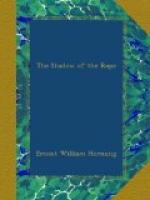She had explored for the twentieth time that strange treasury known as the Chinese Room, a state apartment filled with loot brought home from the Flowery Land by a naval scion of the house of Normanthorpe, and somewhat cynically included in the sale. The idols only leered in Rachel’s face, and the cabinets of grotesque design were unprovided with any key to their history of former uses. In sheer desperation Rachel betook herself to her husband’s study; it was the first time she had crossed that threshold in his absence, but within were the books, and a book she must have.
These also had been purchased with the house. With few exceptions, they were ancient books in battered calf, which Steel had stigmatized as “musty trash” once when Rachel had asked him if she might take one. She had not made that request again; indeed, it was seldom enough that she had set foot inside the spacious room which the old books lined, and in which the master of the house disliked being disturbed. Yet it was anything but trash which she now discovered upon the dusty shelves.
There was Tom Jones in four volumes and the Spectator in eight, Gil Blas and the works of Swift, all with the long “s,” and backs like polished oak; in the lower shelves were Hogarth and Gillray in rare folios; at every level and on either hand were books worth taking out. But this was almost all that Rachel did; she took them out and put them in again, for that was her unsettled mood. She spent some minutes over the Swifts, but not sufficiently attracted to march off with them. The quaint, obsolete type of the various volumes attracted her more as a curiosity than as readable print; the coarse satires of the early masters of caricature and cartoon did not attract her at all. Rachel’s upbringing had deprived her of the traditions, the superstitions, and the shibboleths which are at once a strength and a weakness of the ordinary English education; if, however, she was too much inclined to take a world’s masterpiece exactly as she found it, her taste, such as it was, at all events was her own.
She had naturally an open mind, but it was not open now; it was full and running over with the mysteries and the perplexities of her own environment. Books would not take her out of herself; in them she could not hope to find a key to any one of the problems within problems which beset and tortured her. So she ran her hand along the dusty books, little dreaming that the key was there all the time; so in the end, and quite by chance, but for the fact that she was dipping into so many, she took out the right book, and started backward with it in her hand.
The book was The Faerie Queene, and Rachel had extracted it in a Gothic spirit, because she had once heard that very few living persons had read it from end to end; since she could not become interested in anything, she might as well be thoroughly bored. But she never opened the volume, for in the dark slit which it left something shone like a little new moon. Rachel put in her hand, and felt a small brass handle; to turn and pull it was the work of her hand without a guiding thought; but when tiers of books swung towards her with the opening door which they hid, it was not in human nature to shut that door again without so much as peeping in.




